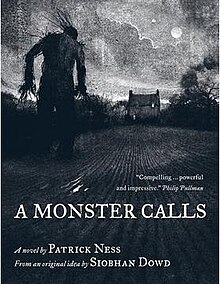My cousin recommended a middle grades book, A Monster Calls by Patrick Ness, which is stunningly illustrated by Jim Kay. I hadn't yet heard of it, but apparently it is causing quite a stir, having already won the Carnegie Medal for literature and the Kate Greenaway Medal for illustration. It is beautifully written, smart, and the pictures are breathtaking--but it is not for the faint of heart; I cried for over an hour when I finished it, which I do not admit lightly. There is such beautiful, difficult truth in this book, though, that I find it impossible not to recommend.
The main character Conor has been having a terrible nightmare, which he cannot talk about and does not reveal until the end of the story, that began when his mother started getting treatments for cancer. In the mean time, a monster begins showing up at 12:07 every night, claiming that he only comes walking in matters of life and death. Conor has no fear of this monster because in comparison to his true nightmare, he isn't scary at all. The monster tells him he is going to tell him three stories, which are "the wildest things of all...Stories chase and bite and hunt," (37) and then, he says, Conor will tell the monster a story--his story, his truth, what happens at the end of his nightmare, that he cannot tell anyone.
What is brilliant about the book is the way the monster interacts with Conor and the way that the stories he tells symbolize the complexity of what it means to be human--Ness has crafted a story that gets at the heart of pain and healing in a way that is significant and weighty and truthful for both 12 year olds and adults. Through the narrative voice of the monster and his stories, he approaches life's biggest fear--loss--in a heart wrenching, beautiful, and most important, truthful, way.
After the first story, they have this exchange: "So the good prince was a murderer and the evil queen wasn't a witch after all. Is that supposed to be the lesson of all this? That I should be nice to her?" He heard a strange rumbling, different from before, and it took him a minute to realize the monster was laughing. "You think I tell you stories to teach you lessons?" the monster said. "You think I have come walking out of time and earth itself to teach you a lesson in niceness?" (63).
This reminded me of some of the work I recently did at the Teachers College Reading and Writing Project's summer institute for the teaching of reading. One of the best ongoing conversations at multiple sessions was about how students often don't do the reading work that will move and change and transform them as people--they look at a complex text and often want to reduce it to the first lesson they can come up with--but this is empty work when in a rich text. Life--and the best kinds of stories--are far more complex than to reduce to a single lesson. And it is a sad day when amazing books get reduced to looking for a lesson (which seems to be what standardized testing is trying to do to reading--reducing it to a task, rather than an opportunity to understand what it means to be human, what it means to belong, to escape from reality for a moment, I could go on).
Conor goes on to say: "I don't understand. Who's the good guy here?" The moster replies: "There is not always a good guy. Nor is there always a bad one. Most people are somewhere in between." Conor shook his head. "That's a terrible story. And a cheat," (64). This is where so many middle grade students find themselves--and because they have been trained to look for the "lesson" on a standardized test, or because for whatever reason they want to look for the easiest way out of a story rather than linger in what it is really offering. The rest of the story follows Conor navigate and make meaning through the darkness in a way that stunned me as a person.
Like the monster says, stories are wild creatures. They help us see. They help us heal. And I love that it is my job to get books in the hands of kids and to teach them how to make their thinking messy, because that is how life goes.

1 comment:
If only I had an English teacher like you when I was in elementary or middle school. The first time I enjoyed reading was in the 10th grade because of Mr. Bridges and that is far too late for anyone to start enjoying reading. *sigh* I love this post and now I want to read the book! <3
Post a Comment